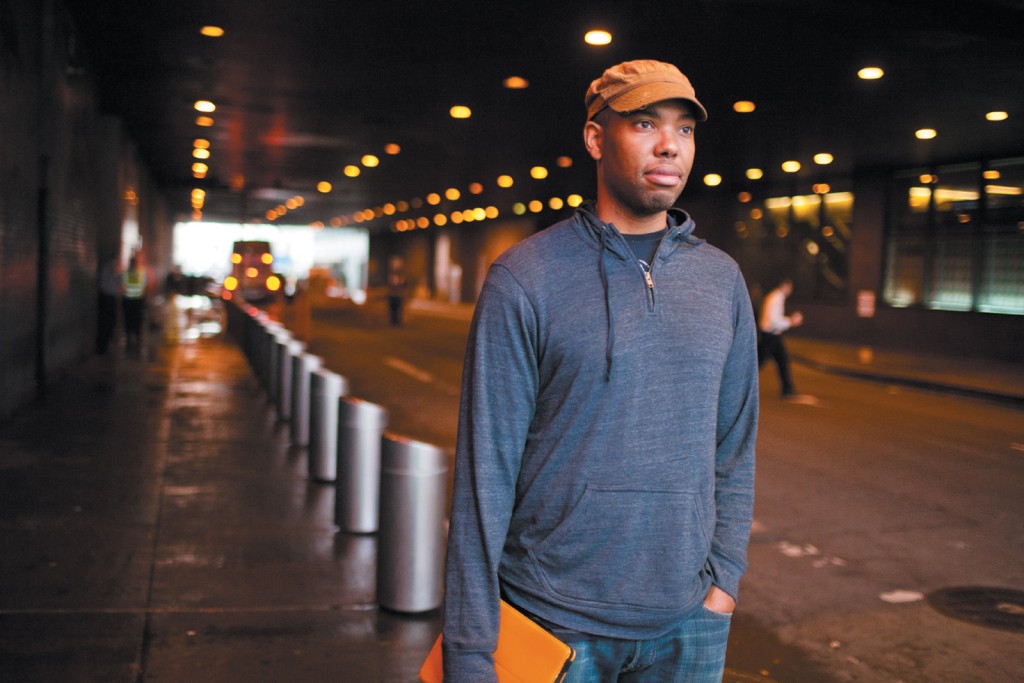
Jack Boucher / Library of Congress
On Homecomings
Everyone wants some place to retreat,
to collapse, to be at home—but
you can’t always go home again.
By Ta-Nahisis Coates
In the summer of 2001, my family and I moved into the Prospect-Lefferts Garden neighborhood in Brooklyn, New York. I was 25. My partner was 24. Our son was 11 months. Prospect-Lefferts Garden is a lovely neighborhood marked by quiet streets and some of the most beautiful architecture in the city. There are several blocks lined with perfectly preserved limestones and brownstones. There is a strong sense of community. Block parties are a tradition. And for those of us who fear the suburbs, Flatbush Avenue hums at the neighborhood’s border. When we moved into the neighborhood, it was predominantly black. A haircut was a two-minute walk away. Great jerk chicken was everywhere. My best friend from college lived on the same block. On Friday evenings you could find us out on his stoop with Jack and Coke in hand (which we drank back then), watching the world go by.
I didn’t make much money back then. I spent much of my creative energies, in that first year, freelancing for The Washington Monthly at 10 cents a word. If I earned $5,000 that year, I would be surprised. Whatever steadiness there was in the house came from my partner, who seemed to not share my uncanny talent for getting fired. In all things, she was a rock and if I have prospered since then, if I have become anything more as a writer and as a man, it is mostly to her credit. Back then, I was certain that it was time to get a real job. No, she would say. You need to write. The upshot of her support is neither vague nor symbolic. One of those articles I freelanced was an attempt to understand the killing of my friend, Prince Jones. Fourteen years later, that article blossomed into Between the World and Me.
My partner—now my wife—loved our old Brooklyn neighborhood. We eventually had to leave after a dispute with our landlord, but we dreamed of moving back. We’d return to visit friends, and gentrification would always be Topic A. Prospect-Lefferts Garden was still black. But most of the young couples moving in were not. We didn’t have the money to move in back then, but that didn’t stop us from fantasizing. We imagined ourselves as aiding in the preservation of a black presence. But there were more personal reasons, too. We wanted to be closer to our friends in the neighborhood. And I wanted, in some tangible way, to reward my partner’s investment in me. I think that had a lot more to do with my insecurities than with her stated desires. We all carry our stories.
Between the World And Me was originally conceived under a different, far worse, title. It was supposed to be a compilation of Civil War essays. It was not supposed to be a big book. Writers don’t prepare for people to read them, so much as they prepare for no one to read them. Anonymity, not celebrity, is the usual result of slogging through a book, no matter how great it is. When celebrity came to me—and I must now admit that it has—a world was thrust upon me, one that I had, in so many ways, spent my life angled against.
Everything—good and bad–about Between the World And Me shocked the hell out of me. I was shocked that Toni Morrison agreed to blurb the book. I was shocked that Cornel West objected to this. I was shocked at how much my old homes—West Baltimore and Howard University—embraced the book. I was shocked to see bell hooks and Kevin Powell attacking it. I was shocked at how many white people read the book. I was shocked at how the fact of white people reading the book came to exert a kind of gravity. I was shocked that I lost some friends. I was shocked at how the book resonated with black and Arab people in France. One of the great moments of life was being in Paris, sitting in the 108 Café in the 19th, building with the people of the diaspora, and understanding that the old pan-African spirit had not yet died.
I was shocked at the royalties. But as soon as I saw them, I knew what I would do with them. I called my old buddy and asked him if anything was available in that neighborhood, in the Prospect Lefferts-Garden which we loved so much. I was thinking of finally being able to take all of our books out of storage. I was thinking of my mother, who would have a space of her own, and could come and stay for as long as she liked. I was thinking of my partner, who was by then my wife, and how much she had given me and made possible.My friend found a house on Lincoln Road. He dubbed it “The Dream.” He told me my wife would love it. She did. I did. There was, by then, a storm around the book, people asking for crazy things, and offering crazier things, still. We thought we’d found a port in that storm. Unlike Park Slope, Fort Green, or Williamsburg, Prospect-Lefferts Garden had always been low-key. In our early years in New York, we felt like we were in on a secret.
But no one keeps secrets in Brooklyn. A few weeks after we bought, another friend sent an item from a local blog gossiping about our possible purchase. We didn’t expect to live anonymously. We thought there might be some interest and we took some steps to dissuade that interest. Those steps failed. Last week, the New York Post, and several other publications, reported on the purchase. They ran pictures of the house. They named my wife. They photoshopped me in the kitchen. They talked to the seller’s broker. The seller’s broker told them when we’d be moving in. The seller’s broker speculated on our plans for renovation. They rummaged through my kid’s Instagram account. They published my home address.
Some of my acquaintances went on Facebook and shared these articles. Other people called up my actual friends and joked about the purchase. Very little of this conversation was negative. Much of it was of the congratulatory “Nigga, we made it” variety. But all of it was premised on a kind of obliviousness, an inability to imagine how horrifying it would be to see all the details of your new life out there for the world to see. It is true what they say about celebrity—people suddenly don’t quite see you. You walk into a room and you are not a person, so much as symbol of whatever someone needs you to be.
this country, take certain positions, and not think about your
personal safety. That’s just the history. And you can’t really be
a human being and not want some place to retreat into yourself,
some place to collapse, some place to be at peace. That’s just
neurology. One shouldn’t get in the habit of crying about having
a best-selling book. But you can’t really sell enough books to
become superhuman, to salve that longing for home.
I want you to know that I have been struggling, these past few months, to write about politics. I feel people, all around me, uninterested in questions and enthralled with prophecy. The best part of writing is the constant searching, the twisting, the turning, the back-and-forth, the things you think you understand, the things you understand more than you know. Prophecy has no real use for writing as discovery. And when people want prophets, they will make you into one, no matter your strenuous objections. If the world wants a “Writer Moves to Brooklyn Brownstone” story, it’s going to have one, no matter your thoughts. You are their symbol. This is all a very poor excuse for not writing. I find myself stuck in the past, pining for another time, blinded by nostalgia, longing for my old horde, longing for my old home.
Within a day of seeing these articles, my wife and I knew that we could never live in Prospect-Lefferts Garden, that we could never go back home. If anything happened to either of us, if anything happened to our son, we’d never forgive ourselves. Even the more likely, more benign, examples were disconcerting—fans showing up at your door (this happened once) or waiting for you on your stoop. Our old neighborhood was not as quiet as we thought. Nothing is quiet anymore—least of all us.
+++++++++++
TA-NEHISI COATES is a national correspondent at The Atlantic, where he writes about culture, politics, and social issues. He is the author of The Beautiful Struggle and Between the World and Me.
>via: http://www.theatlantic.com/politics/archive/2016/05/on-homecomings/481818/


